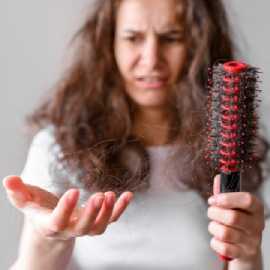Dealing with physical changes to your body as you get older as a man is important. Your metabolism has altered, your skin isn’t nearly as resilient as it was ten years ago, and 1 in 2 men over 40 must cope with male pattern baldness. Either you have it or you don’t, according to what could seem to be a coin flip with a 50% hit rate. But even then, don’t give up because there are plenty of ways to stop the shedding that has already begun (and even partially reverse it).
By eating the right meals, taking vitamins, and utilizing simple at-home remedies, you may rapidly turn your hair goodbye into a “Welcome Back” party.
Eat a lot of protein-rich foods

Protein is one of the most important nutrients for hair development simply because it makes up the majority of hair follicles. Lack of protein in your diet may be a contributing factor in your severe hair loss. To achieve your quota, consume eggs, fatty fish like salmon, herring, and mackerel, as well as lean meats.
Use the proper vitamins

If there is one thing you learn as you improve your nutrition over time, it is that proper vitamin consumption is always a part of the solution. Vitamin B keeps your scalp’s color vibrant, vitamin E keeps your follicles healthy by promoting blood flow there, and vitamin A is necessary for normal levels of sebum (the scalp’s natural oil production).
Try natural remedies using vegetable juice

The greatest solution might not always be at-home cures. Of course, you are free to seek out over-the-counter drugs or the proper vitamins (and only use them after seeing a physician). However, there are times when the secret ingredients are already in your refrigerator. Applying generous amounts of onion, ginger, or garlic juice to the scalp should be properly washed off the following morning. Once you had been taking it consistently for a week or two, you could immediately start to notice a change.
Regularly massage your scalp

In addition to being quite enjoyable and relaxing, a scalp massage, or champi as our ancestors called it, encourages thicker hair by stretching the cells of hair follicles. During the treatment, your hair follicles are stimulated, which results in thicker hair. According to certain theories, regular massages might help to enlarge the blood vessels under the skin, which encourages the growth of hair. Win-win.
Ask your doctor about Finasteride

If you’re looking for a prescription drug that you can utilize with little to no effort, talk to your doctor about Finasteride. Essentially, it lowers testosterone by inhibiting the 5-alpha-reductase enzyme, which converts testosterone to another hormone and, in particular, causes hair loss in men. Finasteride increases the body’s testosterone production, which promotes the growth of scalp hair.
As much as possible, avoid causing harm to your hair

To put it as simply as possible, if you don’t put your hair under a lot of stress, it will grow and flourish more. When you subject your hair to several treatments (straightening, smoothing, regular blow drying, and hair coloring), it suffers. The more frequently and strongly your hair is exposed to heat and chemicals, the more hair it will shed.
Increase your intake of biotin

Vitamin B7 known as biotin promotes the production of keratin in your hair and quickens follicle growth. Biotin has been found to promote hair development, even if there isn’t much evidence that it can reduce hair loss. Therefore, even though it might not be able to fix past damage, it can help stop new damage. Biotin may be found in oats, almonds, onions, sweet potatoes, and eggs.
Ensure that you receive enough rest

You may already be aware of the adage “sleep is the foundation of all restoration,” but it is true in every aspect. Your growth hormones can help you grow hair at a healthy rate by speeding up cell division while you sleep. The recommended amount of sleep every night is seven to nine hours, but receiving merely four to six hours per night can surely harm you over time.
Conclusion:
Other dangerous illnesses, such as autoimmune disorders and nutritional deficits, can also cause hair loss. It’s vital to consult a dermatologist if you’re unsure of what’s causing your hair loss or if you haven’t had any luck with these other suggestions.

